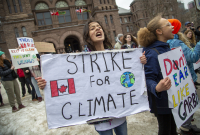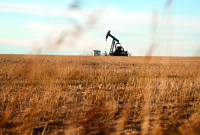Support strong Canadian climate journalism for 2025
On June 19, the Canadian government declared a climate emergency in Canada. But, if we’re in an emergency, why aren’t we acting like it?
The same government that declared the emergency is standing behind a climate plan that would ensure devastating global heating of 4 C or more. At the provincial level, premiers from Alberta, Saskatchewan and Ontario took the federal government’s inadequate carbon price to court, trying to weaken action further. And, all the while, the fossil fuel industry has been ramping up its plans to try to use the federal election to further gut climate action.
But it’s not just the government and big oil falling short of emergency-level action. Our public institutions, including the media, have a responsibility to respond to the climate emergency.
It’s past time we held them accountable.
With the federal election a mere four months away, the most important information for people to have is a clear sense of which federal parties have a real plan to tackle the climate crisis — and we need it before heading to the polls on October 21.
According to the CBC’s Journalistic Standards and Practices, it’s the public broadcaster’s role to make “itself available to get important information to Canadians in a timely fashion” in the event of national emergencies. That’s why the CBC should commit to hosting a federal leaders debate on climate change ahead of election day: to ensure people in Canada have important climate information in a critical, timely fashion.
In 2015, over the course of five federal leaders debates, there wasn’t a single serious conversation about climate action. The few times it did come up, the conversation didn’t give voters the information they needed to truly understand each party’s climate plan. With climate consistently landing near the top of the issues people are thinking about before heading to the polls this fall, we need a dedicated climate debate to make sure that doesn’t happen again.
Hosting a leaders debate would also make it clear the CBC is taking climate change seriously. It was, after all, only a few weeks ago when Paul Hambleton, the CBC's director of journalistic standards, argued using the words climate “crisis” and “emergency” might “sort of imply, you know, something more serious” is happening with climate change. The CBC faced a public backlash for the comments, with hundreds of tweets to the broadcaster, such as writer Derrick O’Keefe’s comment that the “CBC embarasses itself” and Elizabeth May’s comment that “the CBC needs to get a briefing on #IPCC 1.5 degree C report.” The CBC was forced to affirm its commitment to reporting responsibly on climate change. They did so by quickly rolling out a special climate series as a direct response to people “asking the media to do a better job by providing more facts about what is happening and more coverage of possible solutions.”
There will, of course, be those who argue against the idea of a specific debate on climate change. Some won’t want it because they continue to downplay the importance — or existence — of a climate crisis. Others will argue it’s just one issue among many.
However, as demonstrated by the thousands of people who turned out to still-growing conversations about a made-in-Canada Green New Deal, people concerned about climate change refuse to see it as a single issue. That’s because it isn’t a single-issue crisis.
Climate change cuts across every aspect of our lives and our politics. You can’t talk about the economy without talking about who has a plan to take care of workers as the world moves off of fossil fuels. You can’t talk about foreign policy without talking about the Paris Agreement, nor the global scale of the climate crisis. You can’t talk about Indigenous rights and reconciliation without addressing how climate is impacting Indigenous Peoples first and hardest — further compounding the crises these communities are already facing. You can’t talk about health, education nor so many other issues without recognizing a heating planet makes acting on all of these that much more challenging and complex.
At the end of the day, it’s up to the CBC’s senior management how they fulfil their public responsibility. But, as our public broadcaster, it’s up to us to hold them to the highest standard possible. That’s why on July 17, people will be rallying at CBC studios across Canada during the 6 o’clock news to demand a climate debate. Because this is an emergency, and our public institutions, including the CBC, better start acting like it.






Comments
It would appear that CBC is simply another corporate entity with business priorities.
First priority is maximise advertising revenue from highest bidders.
Hence we see CBC TV stationjs filled with advertising for every car company selling internal combustion engines.
If CBC was open and transparent on the crisis of global warming they may well jepordize advertising revenue from automobile manufacturers and oil/gas companies.
Good reason for CBC to be banned from advertising revenue.
As it goes "he who pays the piper calls the tune" !!!
Peter
It is a well know fact that previous CBC National correspondents including but not limited to Peter Mansbridge and Rex Murphy have earned substantial amounts of money as guest speakers at oil & gas functions. How can reporters be unbiased if they accept personal gain from the very sector most responsible for climate change?
For a leaders’ debate on the climate crisis to shed more light than heat I’d suggest, first of all, rethinking the format to eliminate cross-talk and sniping between leaders and to focus on each party’s plans for the next four years. More of a forum than a debate. Then I’d have the moderator (who’d have to be sufficiently knowledgeable herself) give the leaders (and the audience) a quick primer on basic climae science literacy.
At a minimum, something like this: For the purposes of limiting temperature rise to 2 degrees C, what matters is the total accumulation of greenhouse gases in the atmosphere — our carbon budget. Targets like “80 percent reduction in the rate of emissions by 2050″ are deeply misleading.
The only thing that matters in limiting temperature rise is cumulative emissions, the total amount we dump into the atmosphere this century. For any given carbon reduction pathway, the later emissions peak, the faster they have to fall to stay under budget.
Then I’d spilt the forum into two sections: mitigation and adaptation with questions along these lines: What steps will they take to reduce greenhouse gas emissions in time to make a difference? How will they make sure workers affected by these steps can find new employment? What will they do to help communities adapt to the changes that are already baked into the system.
Way more details to work out than I can get into in this comment but should this event come to pass, happen it’s the details that will make all the difference.
This proposed outline is very appropriate. It is necessary that the time be spent on educating the public (and the politicians), moving towards action, AND NOT ON POLITICAL GAME PLAYING. The issue is far too important for the younger generations to let old men obfuscate.